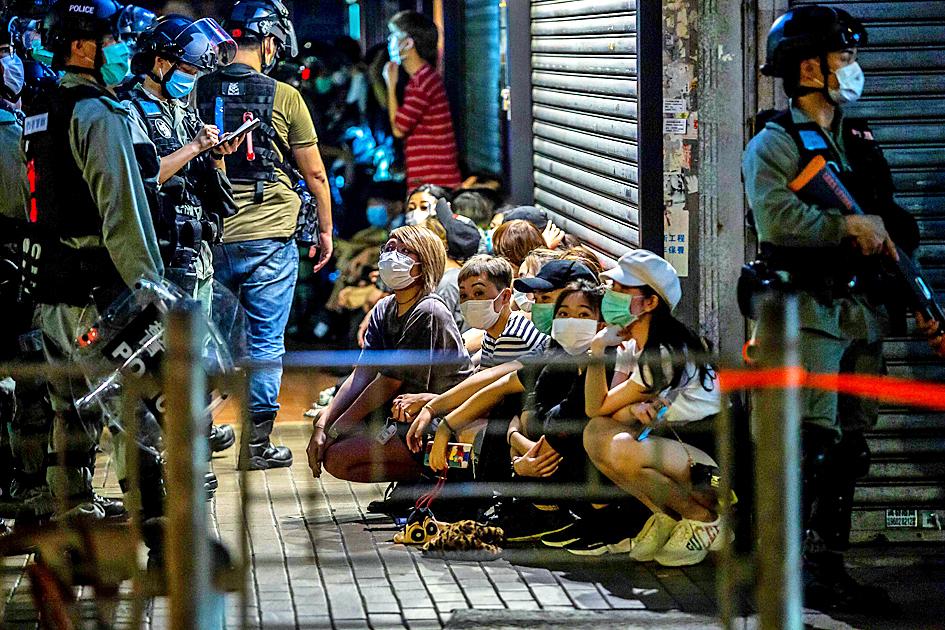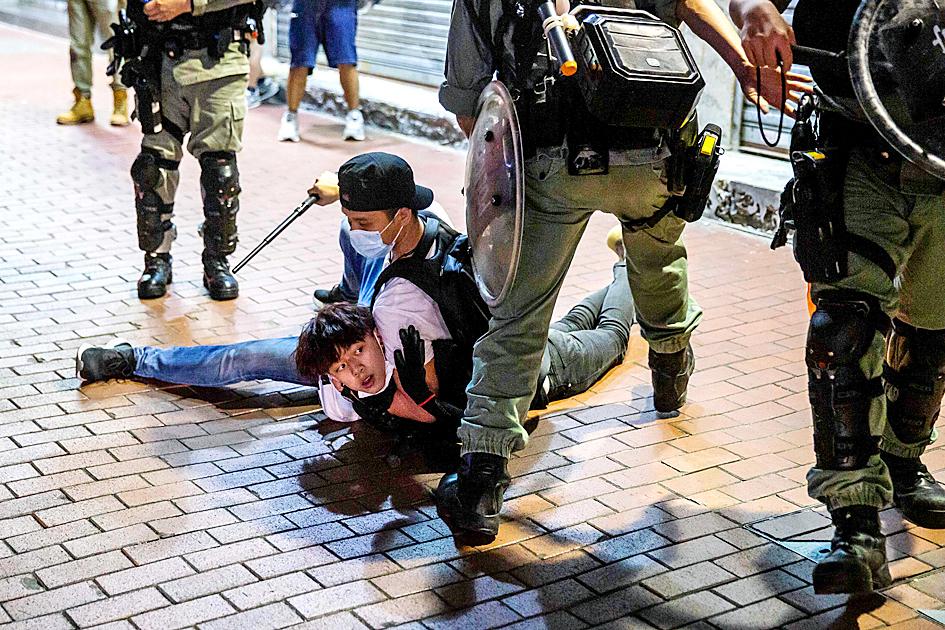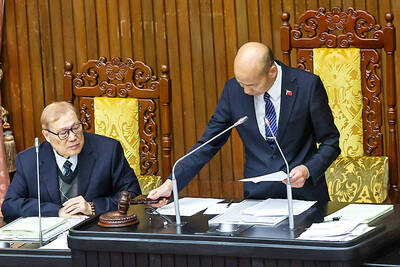Hong Kong police arrested hundreds of people during Sunday’s democracy protests — including a 12-year-old boy — officials said yesterday, in the first major political unrest since the COVID-19 pandemic began.
The disclosure came as Hong Kong Chief Executive Carrie Lam (林鄭月娥) vowed to overhaul the territory’s education system, saying its liberal studies curriculum helped fuel last year’s huge protests.
On Sunday — two days after virus restrictions on gatherings were eased, and bars and gyms allowed to reopen — riot police chased flash-mob protesters through multiple shopping malls.

Photo: AFP
They later used pepper spray and batons against protesters, bystanders and journalists in Mong Kok.
Police said that 230 people between the ages of 12 and 65 were arrested on various charges, including unlawful assembly, assaulting a police officer and failing to produce identity documents.
Others were also fined for breaching disease prevention measures banning more than eight people gathering in public.

Photo: AFP
Hospital authorities said 18 people received treatment for injuries.
In an interview with pro-government Ta Kung Pao published yesterday, Lam described the secondary school program as a “chicken coop without a roof” and said her government would soon unveil its plans.
“In terms of handling the subject of liberal studies in the future, we will definitely make things clear to the public within this year,” she told the paper.
Her comments are likely to inflame those Hong Kongers who fear Beijing is chipping away at the freedoms that make the territory a major international draw as political tensions rise once more.
Sunday’s protests invoked memories of the seven straight months of often-violent youth-led pro-democracy protests last year, when millions hit the streets.
More than 8,000 people have been arrested so far — about 17 percent of them secondary-school students.
For the past four months mass arrests and the pandemic ushered in a period of enforced calm. However, with the territory successfully tackling its COVID-19 outbreak — and social distancing measures easing — unrest is bubbling up again.
During the Lunar New Year holidays, Lam vowed to heal the divisions coursing through Hong Kong, but her administration has offered little in the way of reconciliation or a political solution.
She has resisted calls for universal suffrage or an independent inquiry into the police’s handling of the protests.
With the backing of Beijing, her government is pushing a bill that outlaws insulting China’s national anthem and leading pro-establishment figures are lobbying for an anti-sedition law.
The government says new laws are needed to curb snowballing support — especially among younger Hong Kongers — for democracy and greater autonomy from China.

DEFENDING DEMOCRACY: Taiwan shares the same values as those that fought in WWII, and nations must unite to halt the expansion of a new authoritarian bloc, Lai said The government yesterday held a commemoration ceremony for Victory in Europe (V-E) Day, joining the rest of the world for the first time to mark the anniversary of the end of World War II in Europe. Taiwan honoring V-E Day signifies “our growing connections with the international community,” President William Lai (賴清德) said at a reception in Taipei on the 80th anniversary of V-E Day. One of the major lessons of World War II is that “authoritarianism and aggression lead only to slaughter, tragedy and greater inequality,” Lai said. Even more importantly, the war also taught people that “those who cherish peace cannot

STEADFAST FRIEND: The bills encourage increased Taiwan-US engagement and address China’s distortion of UN Resolution 2758 to isolate Taiwan internationally The Presidential Office yesterday thanked the US House of Representatives for unanimously passing two Taiwan-related bills highlighting its solid support for Taiwan’s democracy and global participation, and for deepening bilateral relations. One of the bills, the Taiwan Assurance Implementation Act, requires the US Department of State to periodically review its guidelines for engagement with Taiwan, and report to the US Congress on the guidelines and plans to lift self-imposed limitations on US-Taiwan engagement. The other bill is the Taiwan International Solidarity Act, which clarifies that UN Resolution 2758 does not address the issue of the representation of Taiwan or its people in

The Philippines yesterday criticized a “high-risk” maneuver by a Chinese vessel near the disputed Scarborough Shoal (Huangyan Island, 黃岩島) in a rare incident involving warships from the two navies. The Scarborough Shoal — a triangular chain of reefs and rocks in the contested South China Sea — has been a flash point between the countries since China seized it from the Philippines in 2012. Taiwan also claims the shoal. Monday’s encounter took place approximately 11.8 nautical miles (22km) southeast” of the Scarborough Shoal, the Philippine military said, during ongoing US-Philippine military exercises that Beijing has criticized as destabilizing. “The Chinese frigate BN 554 was

LEISURE: The new law adds Confucius’ birthday, the anniversary of the Battle of Guningtou, Constitution Day and Little New Year as national holidays The Legislative Yuan yesterday passed new legislation adding four national holidays and making Workers’ Day a national holiday for all sectors. The Chinese Nationalist Party (KMT) and the Taiwan People’s Party used their combined majority in the legislature to push the jointly proposed draft through its third and final reading. This new law supersedes the existing regulations for the implementation of memorial days and state holidays, which are administered by the Ministry of the Interior. The new law recognizes Confucius’ birthday on Sept. 28, the anniversary of the Battle of Guningtou on Oct. 25, Constitution Day on Dec. 25 and “Little New Year,”